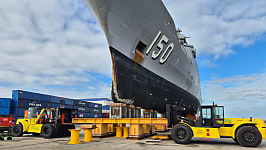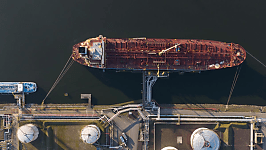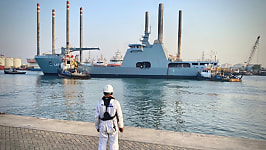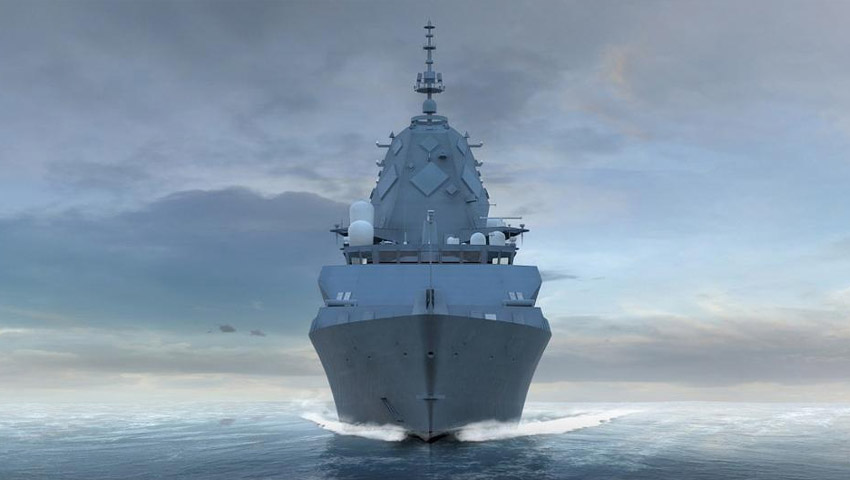Defence Minister Linda Reynolds and Defence Industry Minister Melissa Price have announced the release of the public Australian Industry Capability (AIC) Plan for the first phase of the $35 billion Hunter Class Frigate Program.
ASC Shipbuilding has signed contracts with three more Australian companies on the Hunter Class Frigate Program as part of its approach to growing local industry capability.
The contracts follow the recent announcement by the Commonwealth Government that the Hunter program had received approval to begin prototyping in December this year as planned. The new contracts are a crucial part of ASC Shipbuilding’s strategy to maximise Australian industry involvement in the Hunter program, and beyond.
Two of the contracts are for the prototyping phase of the program and include South Australian-based Adelaide Profile Services, which will process and precision-cut around 250 13-metre lengths of steel that will be used in the five prototyping blocks, and Intertek’s Adelaide Inspection Services, which will conduct non‑destructive testing and mechanical testing to assure high quality fabrication welds on those blocks.
Minister for Defence Linda Reynolds said the release of the AIC Plan demonstrates the government’s commitment to maximising Australian industry involvement in the construction of Defence’s new anti-submarine warfare frigates.
“We can already see the progress that ASC Shipbuilding has made in promoting AIC with the contracts signed to procure Australian steel for the prototyping phase of the Hunter Class Frigate Program. We remain on track to begin the prototyping phase of the Hunter Class Frigate Program at the end of this year,” Minister Reynolds explained.
ASC Shipbuilding Managing Director, Craig Lockhart, said, “Placing contracts with Australian businesses is just one part of our strategy to build Australian industry capability.
“To support the creation a sovereign and continuous naval shipbuilding industry, we are also creating thousands of jobs for Australians and training the future shipbuilding workforce, investing in the transfer of knowledge and technology to Australia and undertaking research and technology projects to drive innovation in the advanced manufacturing sector,” Lockhart explained.
In June 2020, ASC Shipbuilding placed a contract worth around $2.5 million with BlueScope Steel AIS to deliver more than 1,500 tonnes of steel plate that will be used for prototyping.
Earlier this month, ASC Shipbuilding engaged Infrabuild Steel Centre – a South Australian company – to supply around 120 tonnes of locally-made steel to make the jig wagons that will hold and support the movement of ship parts around the Osborne Naval Shipyard.
APS Adelaide Profile Services Operations Manager, Greg Mills, said, “It’s a great opportunity to partner with ASC Shipbuilding on the Hunter Class Frigate Program.
“The relationships we have with ASC Shipbuilding, combined with the agility of our workforce, has already produced successful collaborative results at the early stages of the project.”
Minister Reynolds added, “Australian businesses now on contract include: Sofraco, a New South Wales-based engineering company who will examine test facility requirements for skid based pumping solutions; APS Adelaide Profile Services of South Australia, who will process and precision-cut steel; and Adelaide Inspection Services of South Australia, who will conduct non destructive testing.
“I am proud to be part of a government which puts faith in growing our Hunter Class workforce to more than 2,200 Australians by the late 2020s, and more than a thousand Australian businesses already registered with ASC Shipbuilding to support and equip the Australian Defence Force."
Intertek Industry Services Regional Director, Andrew Mansfield, added, “Intertek’s Adelaide-based NDT team is very pleased to be working with ASC Shipbuilding, providing quality and safety services which will help ensure asset reliability and design integrity. We look forward to contributing to the success of such an important project within the region.”
Sofraco Engineering Systems Managing Director, David Lassau, said, “Defence Programs provide enormous opportunities for Australian industry and we are pleased to have been selected for this study.
“The long-term outcome expected as a result of this study is increased engagement between Defence and industry, and enhanced sovereign capability that contributes to the Commonwealth’s Naval Shipbuilding Program.”
There will also be additional contracts signed with Australian companies as part of the 33 work packages to be released during the prototyping phase, valued in excess of $20 million.
The contracts will include work on specialised steel sections, non-destructive testing, blast and paint services, pipe couplings, cables and ship outfit and furnishing materials.
Defence Industry Minister Melissa Price said significant progress was also being made on other pillars of ASC Shipbuilding’s AIC Plan.
“I commend ASC Shipbuilding on their employee training and apprenticeship programs which are vital to training the growing workforce that will build the Navy’s nine Hunter class anti-submarine warfare frigates,” Minister Price said.
“It is also important that we continue to work with ASC Shipbuilding and engage our industry stakeholders as we have been doing throughout the year, including via a webinar in August with another planned for November.”
The Hunter Class Frigate Program will achieve a minimum of 58 per cent AIC over the life of the acquisition contract.
Minister Price added, “This engagement is critical to explaining to small and medium businesses what opportunities are out there on the Hunter Class Frigate Program and how to get in contact with original equipment manufacturers about becoming a part of supply chains.”
Businesses that would like to register their interest on the Hunter Class Frigate Program should do so through the Industry Capability Network.
In June 2018, the Commonwealth government announced BAE Systems Australia as the successful tender for the $35 billion SEA 5000 Future Frigate program.
The nine Hunter Class frigates will be based on the BAE Systems Type 26 Global Combat Ship currently under construction for the Royal Navy and will replace the eight Anzac Class frigates when they enter service beginning in the late 2020s.
The Hunter class is billed as an anti-submarine warfare (ASW) centric vessel delivering an advanced ASW capability to the Royal Australian Navy at a time when 50 per cent of the world’s submarines will be operating in the Indo-Pacific region.
BAE Systems Australia announced that it had selected Lockheed Martin Australia and Saab Australia as combat systems integration industry partners, responsible for delivering the Australian designed CEAFAR 2 Active Phased Array Radar, Lockheed Martin designed Aegis combat management system and Saab Australia 9LV tactical interface.
The $35 billion program sees ASC Shipbuilding become a subsidiary of BAE Systems throughout the build process beginning in 2020 at the Osborne Shipyard in South Australia, creating more than 4,000 jobs.
BAE Systems expects the AIC for the Hunter Class build will be 65-70 per cent, which will create and secure thousands of jobs for decades.
At the end of the program the Commonwealth will resume complete ownership of ASC Shipbuilding, thereby ensuring the retention in Australia of intellectual property, a highly skilled workforce and the associated equipment.
SEA 5000 is expected to support over 500 Australian businesses who have been pre-qualified to be part of the Hunter Class supply chain, with the Australian steel industry in particular, benefitting from the 48,000 tonnes of steel required to build the ships.
Stephen Kuper
Steve has an extensive career across government, defence industry and advocacy, having previously worked for cabinet ministers at both Federal and State levels.









